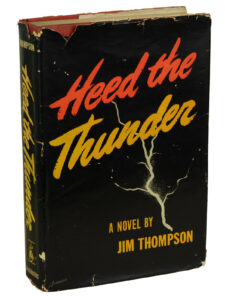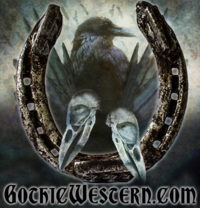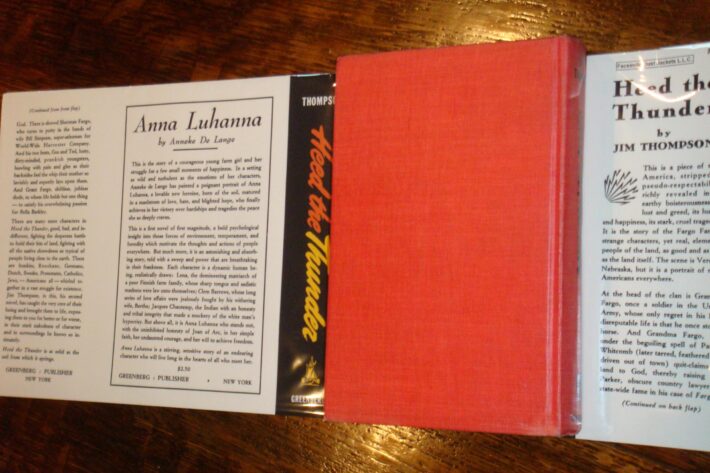In the rural town of Verdon, Nebraska, in the early days of the 20th century, you can’t go ten feet without running into one of the Fargos. So, Grant Fargo argues to his grandfather Lincoln, it’s perfectly all right that he’s desperately in love with his first cousin, Bella-she’s the only source of intelligent conversation for miles, and in a town like Verdon, it would be hard not to end up with a relative of one kind or another. Before it all plays out, men will be murdered, jailed, tarred and feathered or worse, and while everyone in the Fargo clan would kill for the family deeds, God might just end up with them instead. In Heed the Thunder, one of Jim Thompson’s earlier works, Thompson’s signature style collides with a sweeping picaresque of the Gothic American prairie, in a multigenerational saga that’s one part Steinbeck, two parts Dostoyevsky, and all Jim Thompson.
 Heed the Thunder functions clearly and unambiguously as a critique of American capitalism, indeed of the American way of life, which Thompson (with uncomfortable accuracy) identifies as, basically, an obsessive desire to get yours before your neighbor gets his. It’s not a perfect first novel, but it is very good, well worth the time of any fan of Flannery O’Connor or rural gothic generally.
Heed the Thunder functions clearly and unambiguously as a critique of American capitalism, indeed of the American way of life, which Thompson (with uncomfortable accuracy) identifies as, basically, an obsessive desire to get yours before your neighbor gets his. It’s not a perfect first novel, but it is very good, well worth the time of any fan of Flannery O’Connor or rural gothic generally.

Jim Thompson’s stories are about grifters, losers, sociopaths and psychopaths—some at the fringe of society, some at its heart—their nihilistic world-view being best-served by first-person narratives revealing a frighteningly deep understanding of the warped mind. There are few good guys in Thompson’s literature: most of his characters are abusive or simply biding time until an opportunity presents itself, though many also have decent impulses.
Despite some positive critical notice, only after his best years as a writer did Thompson achieve a measure of fame. Yet that neglect might stem from his style: the crime novels are fast-moving and compelling but sometimes sloppy and uneven. Thompson wrote quickly (many novels were written in a month); using his newspaper experience to write concise, evocative prose with little editing.



